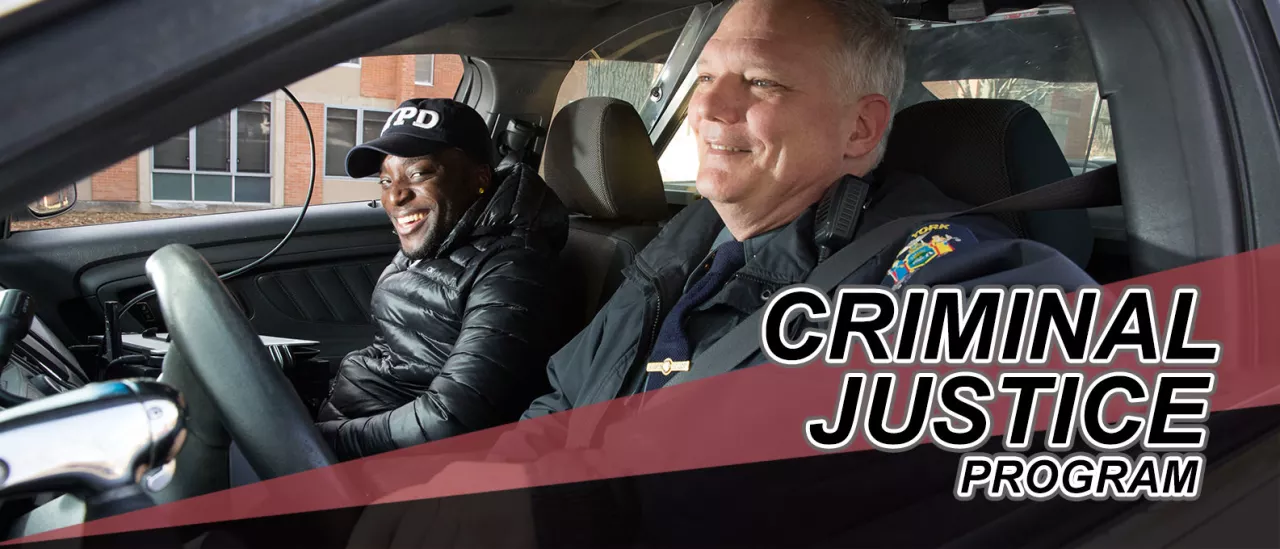SUNY Oneonta’s criminal justice program is one of the best in New York, according to Zippia, a career planning site that uses data from the National Center for Education Statistics and College Scorecard.
SUNY Oneonta was included in Zippia’s list of “10 Best Colleges for Criminal Justice Majors in New York,” a ranking that considered career outcomes, criminal justice emphasis, cost of attendance and amount of debt, among other factors.
The ranking comes as no surprise to Karolina Stypulkowski, a senior criminal justice major from Brooklyn. “I think it’s one of our lesser-known majors, but it shouldn’t be,” she said. “There are so many unique classes you can take in this major that open your eyes to new things.”
Prepare for your dream job
Designed to prepare students for employment and/or further study in criminal justice occupations, SUNY Oneonta’s criminal justice major has a “criminological” focus, concentrating on the causes and consequences of crime, community relations and the analysis of criminal justice policy. Recent graduates of the program are pursuing careers or further study in fields such as law enforcement, corrections, and crime policy.
“The professors in our program really know what they’re talking about,” said Stypulkowski, who wants to work for the FBI someday. “I’m taking a course right now where we go behind the psychological aspect of terrorism. It’s one of those mind-blowing things where things start to click. And you’re like, ‘Wow, OK, I’m learning! I get it now and how it all applies to real life.’”
Because the program is under the Sociology Department umbrella, students who are unsure of their career plans have the flexibility to switch to a track of the sociology major if their goals change – for example, deciding to go to law school (liberal arts track) or become a prison counselor (human services track).
After she graduates, Jahaira Caycho Santos of the Bronx wants to become a child abuse investigator. “I’m passionate about helping children,” she said. “That’s why I’m a criminal justice major.”
~ Jamal Wiltshire, criminal justice major from Brooklyn
Get hands-on experience
Criminal justice majors have lots of opportunities to see firsthand what a career in law enforcement could be like. For example, students in the upper-level “Race, Crime, and Justice” course tour correctional facilities throughout the state and have worked with the local NAACP chapter to identify issues in the community and help remedy them.
Jamal Wiltshire, a senior from Brooklyn, said one of his best experiences at SUNY Oneonta was going on a ride-along with the University Police Department.
“That was my sophomore year, pretty early on,” he said. “They taught me how to use a speedometer, how the campus blue light system works and how to approach someone without being intimidating. They teach you what it’s actually like and give you the tools that you’re going to need someday. I’ve been impressed with all the hands-on activities offered through our criminal justice program.”
Wiltshire said he has also had the opportunity to visit local jails and watch simulations by area police departments. His dream job, he said, would be to work for the CIA, but he plans to start off working for the NYPD and work his way up.
Join the Criminal Justice Club
Angie Mendez, of Queens, and Brandon Gidicsin, of East Meadow, are both members of the Criminal Justice Club, which plans trips to local prisons and brings speakers to campus.
“We had a guest speaker from the sheriff’s office and UPD came in to talk,” said Gidicsi. “Being a member of the club is really beneficial.”
Do an internship
All criminal justice majors are required to complete an internship. Fernando Pena, a business economics major and criminal justice minor from the Bronx, did an internship with the Brooklyn District Attorney’s office, where he processed arrest reports, interviewed police officers, gathered case documents and read depositions.
“It was a great experience,” he said. “Some internships you’re getting coffee and printing copies, but to be actually involved and getting a taste of what that whole criminal justice process is like was really cool.”
